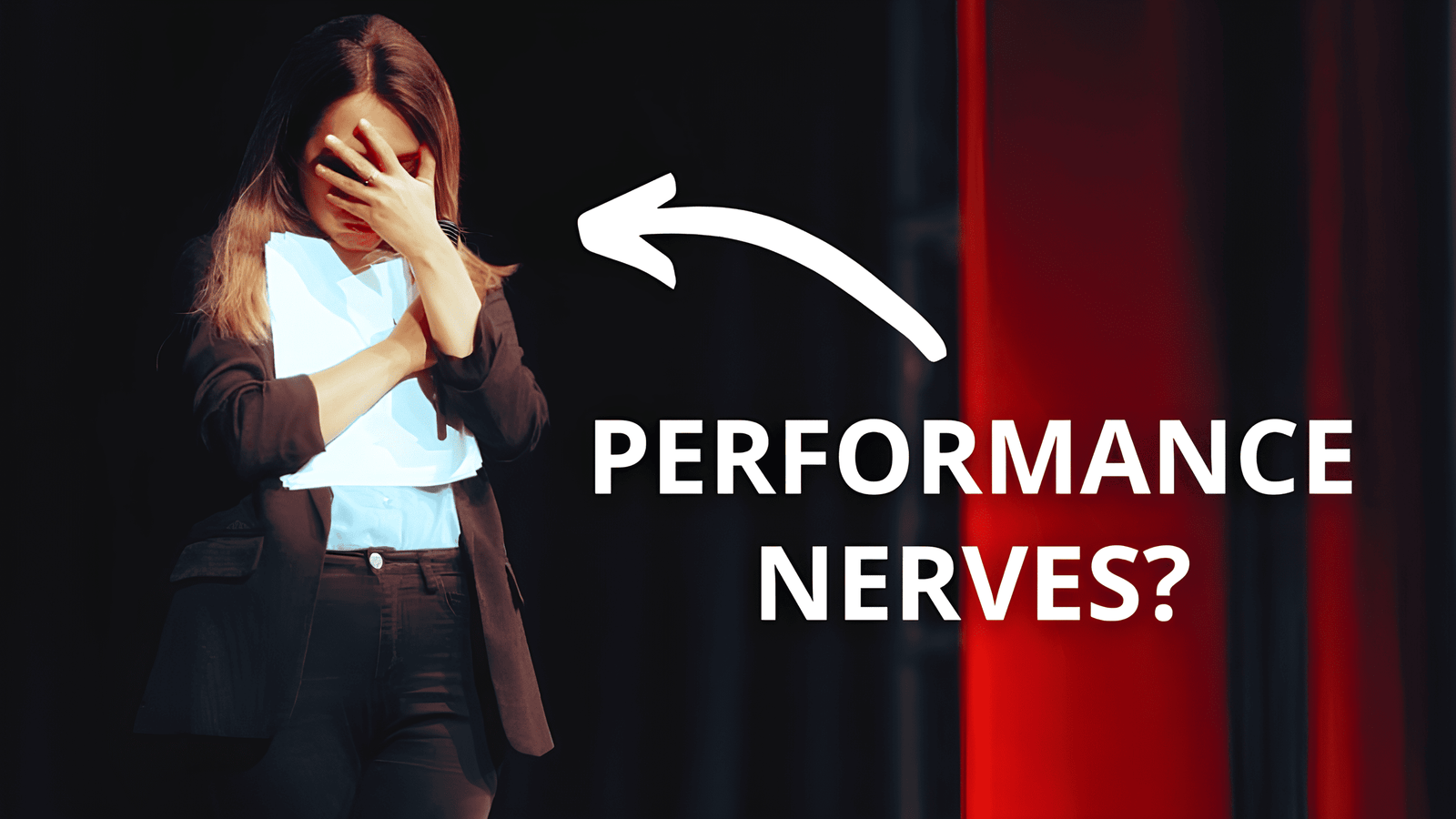Do you feel shivers down your spine each time you think about performing with your instrument in front of the audience? Some people call it nervousness, while others consider it performance anxiety, but the truth is that it’s a common problem for many musicians. In this article, we will explore how to get over it and sound your best during your next concert.
Performance Anxiety: Symptoms to Recognize It
Performance anxiety is when you feel like you want to share music you’ve been working on for so long and you finally come on the stage, start playing and ... make a mistake. Then you make another mistake, and all your performance turns into a nightmare where you struggle just to make it end.
As researchers say, music performance anxiety is experienced by between 15% and 20% of musicians, no matter if they are students or professionals. Performance anxiety goes hand in hand with the following symptoms:
1. Emotional symptoms
Musicians may experience fear, worry, embarrassment, and self-doubt before hitting the stage or while being on it. This prevents them from focusing on music and enjoying playing in general.
2. Cognitive symptoms
Performance anxiety may trigger negative thought patterns, such as excessive self-criticism or unrealistic expectations, which creates the cycle of fear and affects self-confidence.
3. Physical symptoms
Because of performance anxiety, musicians may also experience increased heart rate, shortness of breath, trembling limbs, sweating, dry mouth, and muscle tension.
4. Behavioral symptoms
Performers may also avoid situations that trigger anxiety, distancing from social interactions.

Performance anxiety is rooted in excitement, which signals that you care about your performance. It’s a normal feeling for everyone, including your favorite musicians. Just imagine for a second a situation when your favourite band or singer doesn’t care about the upcoming show at all. Would you like to see them after that? That’s why caring for something is absolutely okay. However, nervousness negatively affects your playing, forcing you to make mistakes and spoiling your sound. Fortunately, you can reduce its impact.
Why You Feel Nervous
There are three main reasons why you may feel anxious before coming on the stage:
1. Fear of failure. You may feel trapped in what-if scenarios too much by asking yourself: what if I am not good enough? What if I fail? This fear makes musicians focus on what could go wrong instead of how well they can perform.
2. Unrealistic expectations. Performers may be too strict with themselves and expect perfect results, literally putting themselves into all-or-nothing situations, which only increases stress.
3. Lack of confidence. If musicians don’t have enough belief in themselves and their success, they increase their state of anxiety, which may lead them to avoid trying new things.
How to Overcome Performance Anxiety
Let’s explore which strategies you can use during your upcoming concert to help you get over nervousness on stage. They effectively work, whether you play in front of the family or prepare for a jazz gig.
Don’t Try to Impress Your Audience
The thing is that when you play something that is easy for you, you don’t experience much nervousness or don’t experience it at all. However, once you want to impress the public, you are likely to choose something harder and that is where the problem begins. In most cases, you think about hard stuff as the way to sound better and it always ends up with the performance turning into exhausting moments when you hardly fight through it. On the contrary, the simpler stuff is often seen as the way to sound lame and uninteresting, but it will definitely make you sound better.

Tip: Play songs that feel easier for you instead of selecting harder ones to impress someone.
Make Stuff Easier for You To Play
You have definitely experienced the situation when you practice some pattern and play wrong a few times, but at the fifth or sixth attempt you do it right and move to another part. However, you play it right just one time, which creates an imbalance compared to times you’ve played it wrong.
Tip: Play the music pattern right more times than you play it wrong.
Use Recordings to Simulate Pressure, Which You May Feel on Stage
There’s a common thing that people start noticing mistakes as soon as they are aware of how they play. For instance, many notice them once they push the button Record. Recording is a good way to start noticing mistakes, which you normally don’t notice. It’s also useful to make your playing more perfect during rehearsals. Once you have worked on your typical mistakes, you will think less about intonation and technique on stage.
Tip: Record yourself to see things you miss when you immerse yourself into playing your instrument.
Don’t Focus on Yourself
Once you start focusing on your feelings, you neglect the most important thing — the concert isn’t about you. It’s about music. At some point, people hitting the stage and wanting to impress the public want to show the audience that they are good trumpeters, flutists, guitarists, etc. This makes musicians focus on themselves, involving too much ego and playing harder stuff. The nervousness is rooted in the feeling of being in the spotlight, while the performance should be about the music.
Tip: Make your performance not about yourself but about music.
Play Music For Others
If you always play in your room for yourself, you never have the opportunity to experience nerves and train the ability to get over them. The more you play in front of people, no matter how small or big your audience is, the more experience you gain to get through the show with the best impressions.

Tip: Step out of your comfort zone and start playing in front of people.
Final Word
Feeling anxious before hitting the stage is a common problem for many musicians. You’re not alone. We hope our tips and strategies help you see ways to deal with performance anxiety better. Using our tips, you can reframe your idea about nervousness and shift your perspective away from yourself and onto music you play.
Recently we’ve shared tips on How to Find Your Unique Musical Voice. Feel free to check it out to grab useful insights.
If you’re looking for high-quality accessories for musical instruments or skill development tools at the best prices ever, visit our Exclusive Deals category.



 https://kgumusic.com/pages/about-us
https://kgumusic.com/pages/about-us